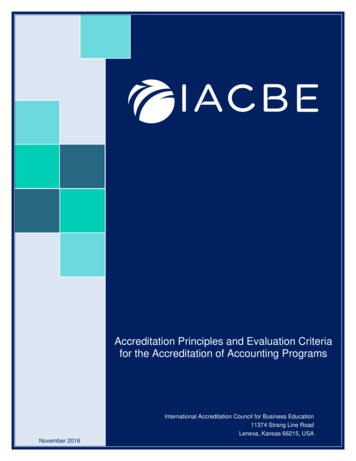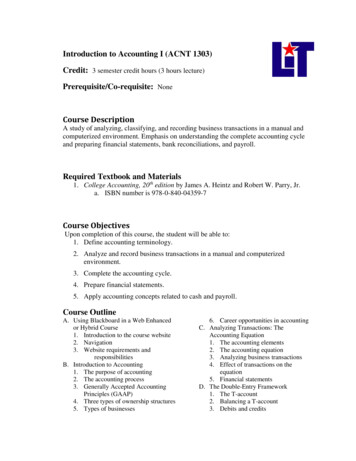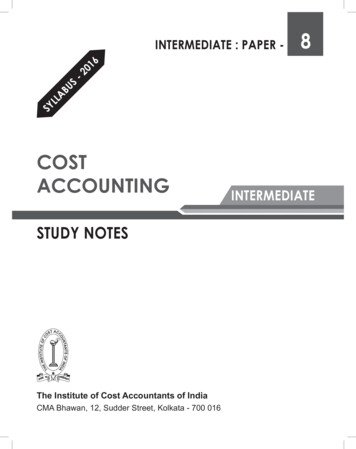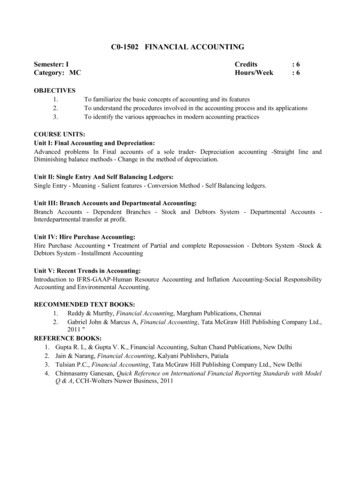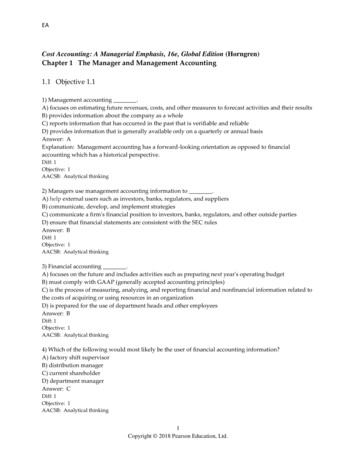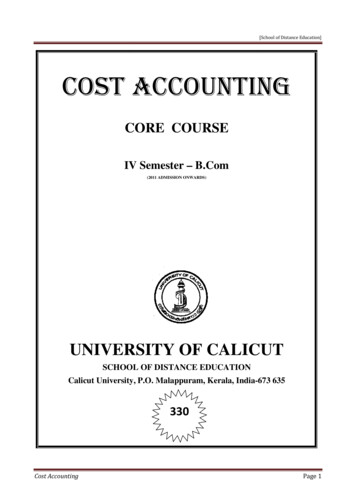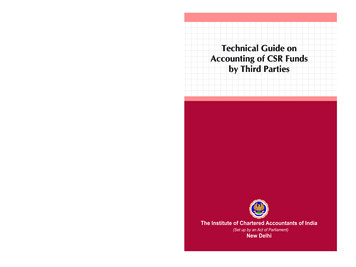
Transcription
Technical Guide onAccounting of CSR Fundsby Third PartiesISBN : 978-81-947221-3-7February 2021 P2787 (New)
Technical Guide on Accounting ofCSR Funds by Third PartiesThe Institute of Chartered Accountants of India(Set up by an Act of Parliament)New Delhi
ForewordThe Government of India, vide the enactment of Companies Act, 2013, hasintroduced the Corporate Social Responsibility (CSR) as a mandatoryprovision by imposing statutory obligation on Companies to take up CSRprojects towards social welfare activities. This has made India the only countrywhich has regulated and mandated CSR for some select categories ofcompanies registered under the Act.As per the data available on the National CSR Data Portal of the Ministry ofCorporate Affairs, Government of India, total CSR spend was Rs. 18,655 crorein the year 18-19 and Rs. 7,823 crore in the year 19-20. A majority of theseCSR programs are implemented through third parties like NGOs, Societies,Trusts and Section 8 Company. Therefore, a need was felt to guide themembers on the accounting of the CSR Funds in the books of the third parties.Accordingly, CSR Committee of the ICAI thought it fit to come out with thispublication and provide requisite guidance to the members.I complement the CSR Committee and its Chairman CA. Pramod Jain, ViceChairman CA. Charanjot Singh Nanda and all committee members for theiractive support in timely bringing out this ‘Technical Guide on Accounting ofCSR Funds by Third Parties’. I also compliment the Committee Secretariat inproviding active support in the release of the same.CA Atul Kumar GuptaPresidentDate: 01.02.2021
PrefaceCorporate Social Responsibility is consistently gaining importance as it hasbecome a tool of achieving the sustainable development goals through public private partnership. The Companies Act, 2013, has mandated that companiesfulfilling certain criterion, has to spend 2% of its net profit on certain activitiesas specified in Schedule VII of the Companies Act, 2013. The Schedule VII isoverlapping with the United Nations Sustainable Development Goals 2030, towhich India is a signatory.With the enactment of the Companies Act, 2013, huge funds have been madeavailable for investment is development projects. However, it has beenreported that majority of the companies are engaging in the projects throughseparate NGOs, Societies, Trusts and Section 8 Companies. Therefore, aneed was felt to monitor the implementation of the projects and record themovement of funds with the third parties. The CSR Committee had issued anAdvisory for Members of the Institute and Companies to whom CSR provisionsunder Companies Act, 2013 apply, for the certification of utilization of fundswith the third parties.With the release of this Technical Guide on Accounting of CSR Funds by ThirdParties, an effort has been made to guide the members on the accountingentries to be made for the recording the movement of the CSR Funds with thethird parties.I am thankful to CA. Atul Kumar Gupta, President and CA. Nihar NiranjanJambusaria, Vice President for their support in bringing out this TechnicalGuide. I would also like to place on record my deep appreciation for thevaluable inputs of the members of the CSR Committee including CA. M. P.Vijay Kumar(Central Council Member) and CA. Charmi Shah, in the publicationof the Technical Guide. I also place on record my sincere thanks to CA. RajeshMittal, CA. Sonali Das Halder and CA. Shakun Goel for the drafting of theTechnical Guide.Place : New DelhiDate : 01.02.2021CA. Pramod JainChairmanCSR Committee
ContentsIntroduction . 1Objective . 1Scope . 2Definitions . 2Implementation of CSR Activities . 3Accounting of Expenditure in the books of Company . 6Brief of Third Parties . 6CSR contribution received by third parties from a . 7Accounting for CSR Funds by Third Parties . 8Utilization Report of CSR Contribution received by Third Parties . 12ANNEXURES . 14
Technical Guide on Accounting ofCSR Funds by Third PartiesIntroduction1.Section 135 of the Companies Act, 2013 (the Act), requires the Boardof Directors of every company having a net worth of Rupees 500 croreor more, or turnover of Rupees 1,000 crore or more or a net profit ofRupees 5 crore or more, during the immediate preceding financial year,to constitute a Corporate Social Responsibility Committee of the Board.2.The Corporate Social Responsibility Committee has to formulate andrecommend to the Board, a Corporate Social Responsibility Policywhich shall indicate the activities to be undertaken by the company inareas or subject as specified in Schedule VII of the Act.3.The Board has to ensure that the company spends in every financialyear at least 2% of the average net profits of the company made duringthe three immediately preceding financial years or where the companyhas not completed the period of three financial years sinceitsincorporation, during such immediately preceding financial years, onCorporate Social Responsibility (CSR) in pursuance of its policy in thisregard.4.Once the CSR expenditure is recognised and measured by thecompany, the next step is accounting of the expenditure on CSRactivities by companies for which the CSR Committee of the Institute ofChartered Accountants of India (ICAI) has already issued a “TechnicalGuide on Accounting for Expenditure on Corporate Social ResponsibilityActivities”.Objective5.The objective of this Technical Guide is to provide guidance on theaccounting, presentation and disclosure of CSR funds by the entitiesreceiving the CSR contribution for implementing the CSR activities onbehalf of the Company i.e. the cases wherein the CSR activities arecarried out by the company through third parties.
Technical Guide on Accounting of CSR Funds by Third PartiesScope6.What constitutes CSR activities is specified in Schedule VII to the Act.Reference is also invited to the circular issued by the Ministry ofCorporate Affairs (MCA) No. 21/2014, Notification dated October 24,2014 and clarification by MCA on COVID activities and contribution toPM CARES fund. This Technical Guide does not deal with identificationof activities that constitute CSR activities but only provides guidance onaccounting for CSR funds by third parties.Definitions7.For the purpose of this Technical Guide, the definitions mentioned at sl.nos. (a) to (e) are reproduced from the Companies Act, 2013, and theapplicable Companies (Corporate Social Responsibility Policy) Rules,2014 (the Rules), as amended by the Companies (Corporate SocialResponsibility Policy) Amendment Rules, 2021 read with clarificationissued in general circular by MCA and in the event of any change inthe Act or the Rules made thereunder, these definitions shall standautomatically revised/modified to that extent:(a)Financial Year: As per sub-section (41) of section 2 of the Act,“Financial Year”, in relation to any company or body corporate,means the period ending on the 31st day of March every year,and where it has been incorporated on or after the 1st day ofJanuary of a year, the period ending on the 31st day of March ofthe following year, in respect whereof financial statement of thecompany or body corporate is made up:Provided that on an application made by a company or bodycorporate, which is a holding company or a subsidiary orAssociate of a company incorporated outside India and isrequired to follow a different financial year for consolidation of itsaccounts outside India, the ROC may, on an application made toit, if it is satisfied, allow any period as its financial year, whetheror not that period is a year:(b)Company means a company incorporated under this Act or underany previous company law;(c)Net Profit: According to Explanation to sub-section (5) of section2
Technical Guide on Accounting of CSR Funds by Third Parties135 of the Act, "net profit" shall not include such sums as may beprescribed, and shall be calculated in accordance with theprovisions of section 198. Further clause (h) of sub- rule (1) ofRule 2 of the Rules, “Net Profit” means the net profit of acompany as per its financial statement prepared in accordancewith the applicable provisions of the Act, but shall not include thefollowing, namely:(i)any profit arising from any overseas branch or branchesof the company, whether operated as a separate companyor otherwise; and(ii)any dividend received from other companies in India, whichare covered under and complying with the provisions ofsection 135 of the Act:Provided further that in case of a foreign company covered underthese rules, net profit means the net profit of such company asper profit and loss account prepared in terms of clause (a) of subsection (1) of section 381, read with section 198 of the Act.(d)Turnover: As per sub-section (91) of section 2 of the Act,“Turnover” means the gross amount of revenue recognised in theprofit and loss account from the sale, supply, or distribution ofgoods or on account of services rendered, or both, by a companyduring a financial year;Implementation of CSR Activities8.The amended Rule 4(1) of the Companies (Corporate SocialResponsibility Policy) Rules, 2014 requires that the Board of Companyshall ensure that the CSR activities are undertaken by the companyitself or through third parties.The third parties as defined in above sub-rule (1) are as under:AAny of the below entity established by the company, eithersingly or along-with any other company which are registeredu/s 12A and 80G of the Income Tax Act, 1961 being: a company established under section 8 of the Act, or a registered public trust, or3
Technical Guide on Accounting of CSR Funds by Third Parties a registered society.orBAny of the below entity established by the CentralGovernment or State Government: a company established under section 8 of the Act, or a registered trust, or a registered society.orCAny entity established under an Act of Parliament or a StatelegislatureorD9.Any of the following entity which have an established trackrecord of three years in undertaking similar programs orprojects and which are registered u/s 12A and 80G of theIncome Tax Act, 1961 being: a company established under section 8 of the Act, or a registered public trust, or a registered societyIt is important to note that as per the amended Rule 4 (2) of theCompanies (Corporate Social Responsibility Policy) Rules, 2014 all thethird parties as mentioned at Para 8 above who intends to undertakeany CSR activity, has to register itself with the Central Government byfiling the Form CSR-1 electronically with the Registrar, with effect fromthe 1stApril 2021.However, such registration would not be mandatory as per Proviso tosub-rule (2) of Rule 4 where the CSR projects or programmes areapproved prior to 1 stApril 2021.10.The implication of this rule is that requirements for CSR have beenrobust so as to utilise the expertise of a third party to undertake CSRactivities on behalf of the Company. Also, such outsourcing may bedesirable as it allows for non-profits organizations who are specialised4
Technical Guide on Accounting of CSR Funds by Third Partiesin carrying out a particular kind of social activity, to undertake it for othercompanies as well.11.Many corporate houses in India are working or implementing their“Corporate Social Responsibility” programs through their ownfoundations being a society or a section 8 company or trust, which isestablished by the company (or group of companies) which is requiredto comply with CSR regulations. These organizations contribute therequired amount to be spent on CSR during the financial year to suchentity established by them. These entities engage in various types ofcharitable or philanthropic activities, which are the activities as specifiedin Schedule VII of the Companies Act 2013.Other Corporate Houses, which have not established any society,section 8 company or trust of their own; either utilize their in -housefacilities or engage, permitted third party trusts, societies or Section 8Companies for their CSR compliance. A company must follow athorough and stringent selection process to ensure that theorganizational goals towards CSR are achieved in the most transparent,effective and efficient manner.12.As per amended Rule 4(3) A company may engage internationalorganisations for designing, monitoring and evaluation of the CSRprojects or programmes as per its CSR policy as well as for capacitybuilding of their own personnel for CSR. The International organizationhas been defined in Rule 2(1)(g) as under:“International Organisation” means an organisation notified by theCentral Government as an international organisation under section 3 ofthe United Nations (Privileges and Immunities) Act, 1947 (46 of 1947),to which the provisions of the Schedule to the said Act apply.13.Rule 4(4) of the Companies (Corporate Social Responsibility Policy)Rules, 2014 provides that a company may collaborate with othercompanies for undertaking projects or programmes or CSR activities insuch a manner that the CSR Committees of respective companies arein a position to report separately on such projects or programs inaccordance with the CSR rules.5
Technical Guide on Accounting of CSR Funds by Third PartiesAccounting of Expenditure in the books ofCompany14.The CSR Committee of Institute of Chartered Accountants of India(ICAI) has already issued a “Technical Guide on Accounting forExpenditure on Corporate Social Responsibility Activities” in June 2020.15.The brief issues elaborated in the above publication are narrated asunder: General Recognition & Measurement criteria of CSR Spend Treatment of Unspent CSR Amount Treatment of Excess CSR Spent Measurement of CSR spend made in Kind Treatment of Surplus arising out of CSR Activities Presentation & Disclosure RequirementsAll the above issues have already been dealt with in detail for whichreference is drawn to the Technical Guide issued by CSR Committee ofICAI.Brief of Third Parties16.In India, social activities can be undertaken through various legalstructures such as registered public trusts, registered societies orcompanies with charitable objects. The choice of a legal structure maydepend on several aspects including limitation on liability of personsinvolved and ease of regulatory compliances.17.Section 8 Company is a Company that is licensed under Section 8 ofthe Companies Act, 2013 (erstwhile referred as the Section 25Company under the Companies Act, 1956) which has its main object;inter alia, promoting research, social welfare, religion, charity,commerce, art, science, sports, education, and the protection ofthe environment or any such other object, provided that the profits, ifany, or the other income is applied for promoting only towards theobjects of the company and are not to be distributed as dividend.However, in sec. 8(2) of Companies Act 2013, it is expressly provided6
Technical Guide on Accounting of CSR Funds by Third Partiesthat these companies will enjoy the privileges and be subject to all theobligations of limited companies.18.Therefore, section 8 companies are treated as limited companies andunless there is a specific deviation provided for (in terms of compliancewith any provisions of the Act), have to comply with the provisionsapplicable to a regular limited company.19.Societies may be registered with the charitable objectives under theCentral / State Government regulations. The Law / Act applied tosocieties is Societies Registration Act, 1860.20.Trusts with the charitable objectives may be registered under the StateGovernment regulations, if any, like in Maharashtra it is regulated by theBombay Public Trust Act, 1950, in Rajasthan is governed by theRajasthan Public Trust Act, etc. There are various states, which do nothave any regulation to register such charitable trusts. In such cases,they should be registered with the Income Tax Act, 1961.21.It is important here to note that as per the amended rules the abovereferred Section 8 Company or registered public Trust or registeredSociety should be registered both under section 12A as well as undersection 80G of the Income Tax Act, 1961.22.For receiving funds from foreign companies such entities should haveregistration under Foreign Contribution Regulation Act (FCRA).CSR contribution received by third parties from aforeign source23.The charitable entities can accept foreign contribution from a foreignsource only if they are registered under Foreign Contribution RegulationAct (FCRA). Without FCRA approval, charitable entities in India cannotlegally receive foreign contributions. The FCRA deems an Indiansubsidiary of a foreign company to be a foreign company, andconsequently, a foreign source. Further, Indian companies with foreignownership of more than 50% may also be treated as foreign source ifthe nominal value of its share capital is not within the limits specified forforeign investments under FEMA 1999.24.The Proviso to Section 2(1)(j) of FCRA provides that:7
Technical Guide on Accounting of CSR Funds by Third Parties“Provided that where the nominal value of share capital is within thelimits specified for foreign investment under the Foreign ExchangeManagement Act 1999, or the rules or regulation made thereunder,then, notwithstanding the nominal value of share capital of a companybeing more than one half of such value at the time of making thecontribution, such company shall not be a foreign source.”25.Hence, in case of an Indian subsidiary of a foreign company, or anIndian company which have foreign ownership of more than 50% needto ensure that in case they utilise the services of a non-profitorganization (NPO) to carry out their CSR activities, such entity musthave obtained prior permission from the Central Government underFCRA. The permission, when granted, would apply to only a specificproject and specific amount, which means that the NPO cannot usecontribution for a different project or for any additional funding for thesame project.Accounting for CSR Funds by Third Parties26.27.The third parties i.e. section 8 company, or a registered trust orregistered society may receive Corpus donation, which could be a CSRexpenditure in the hands of the donor company if the required conditionsare complied with. Corpus donations are with a specific directionregarding the use of the funds and characteristically capital in nature.MCA in General Circular No.21/2014 dated 18th June 2014 has clarifiedthat contribution to Corpus of a Trust/ society/ section 8 companies etc.will qualify as CSR expenditure as long as:a.the Trust/ society/ section 8 companies etc. is created exclusivelyfor undertaking CSR activities, orb.where the corpus is created exclusively for a purpose directlyrelatable to a subject covered in Schedule VII of the Act.The accounting entry for such corpus donations received may be asunder: ParticularsBank A/cTo Corpus DonationAmount (in Rs.)Corpus DonationDr.8 . .
Technical Guide on Accounting of CSR Funds by Third PartiesSuch corpus donation received by the third party should be taken to theBalance Sheet of the third party and not charged to the Income andExpenditure A/c.28.Other than making corpus donations as stated in previous paragraph, acompany may make CSR contribution to third parties specifying theprojects or programs to be undertaken and the modalities of utilizationof funds of such projects as required by CSR Rules. The amountsreceived by such third parties have to be recognized accordingly in thebooks of accounts.The accounting entry for such CSR contribution received andexpenditure on the specified project may be as under: ParticularsAmount (in Rs.)CSR ContributionBank A/cDr. .To CSR Contribution ABC .(Fund Type as per donor projects)Expenses out of CSR DonationCSR Project Expenditure (or any relevant .Expenditure Account) Dr.To Bank .Fixed Assets acquired out of CSR DonationFixed Asset A/cDr. .To Bank .Both, the contribution received and expenditure made should becharged to the Income and expenditure A/c of the third party. Fixedassets acquired should be taken to the Balance Sheet of the third party.29.There may be instances wherein the CSR contribution is received inkind. The accounting entry for such CSR contribution received in kindand its utilization may be as under: ParticularsAmount (in Rs.)CSR Contribution in kind being Fixed Asset or forming partthereofFixed Asset / Capital WIPDr.9 .
Technical Guide on Accounting of CSR Funds by Third PartiesTo CSR Contribution ABC (Valuation to be the cost to donor)Receipt of CSR Contribution in kind being items to bedistributed in a projectItem A/c Dr. .To CSR Donation in kind A/c .(Valuation to be the cost to donor)Distribution of CSR Contribution in kindCSR Expenditure (or any relevant Expenditure .Account) Dr.To Item A/c 30.If the third party is receiving contribution from different companies fordifferent projects, then the amounts should be identified project-wiseand the receipts as well as amounts spent corresponding to that projectsshould be marked and reflected separately.The accounting entry for such CSR contributions received for variousprojects and corresponding expenditure may be as under: S. No. Particulars1223Dr. AmountCr. Amount(in Rs.)(in Rs.)CSR Contribution for different projectsBank A/cDr. .To CSR Contribution A / Project A .(Fund / project name as per donor projects)Bank A/cDr. .To CSR Contribution B / Project B .(Project name as per donor projects)Expenses out of CSR DonationCSR Expenditure Project A A/c Dr. CSR Expenditure Project B A/cDr. .To Bank A/c .(Expenditure can be booked with its name of its nature andidentified to related project. In case of amounts utilized foracquisition of capital asset, the capital asset head should bedebited)10
Technical Guide on Accounting of CSR Funds by Third PartiesBoth, the contribution received and expenditure made should becharged to the Income and expenditure A/c of the third party. Fixedassets acquired should be taken to the Balance Sheet of the third party.31.The CSR donations received by the third parties must be applied foragreed project(s) within the specified period as per the projects /programs in CSR policy of the donor. In case the CSR donations are notutilized within the specified period during the year, the same may eitherto be returned to the donor or the same should be utilized as specifiedin the agreement /MOU with the donor company.In case the unspent amount is to be returned then the accounting entrymay be as under: S. No.132.ParticularsDr. Amount Cr. Amount(in Rs.)(in Rs.)Return of unspent amountCSR Contribution A / project ADr. .To Bank A/c In case the amount required to be spent on the project remains unspentat the end of the year, then the entity needs to accumulate the balanceamount to be utilized in future period. Such unspent amount at the endof the year would be carried forward to the next year and the requiredformalities / Compliances (if the third party is registered under IncomeTax Act) should be done. If the entity is registered u/s 12A, then thecharitable entity needs to e-file Form 10 specifying the purpose ofaccumulation before filing of return of income.The accounting entry for the accumulation may be as under: S. No.1ParticularsDr. Amount(in Rs.)Cr. Amount(in Rs.)Accumulation of unspent amountCSR Contribution project ADr. .To CSR Fund – Project A A/c The CSR Fund – Project A A/c should be taken to the Balance Sheet.33.When the required compliances are made under the Income Tax Act,the accumulation for five years is treated as application of income in theyear of accumulation under the Income Tax Act. In subsequent years,11
Technical Guide on Accounting of CSR Funds by Third Partieswhen the expenditure is made out of such accumulated fund, theaccounting entry may be as under:S. No.1ParticularsDr. Amount Cr. Amount(in Rs.)(in Rs.)Expenditure out of Accumulated unspent amountCSR Fund – Project A A/c Dr. .To Bank .The amount spent out of this accumulated fund would not be charged tothe Income and expenditure A/c, but would be reduced from the Fundcreated.The Research Committee of ICAI in August 2009 has issued a TechnicalGuide on Accounting for Not-for-Profit Organisations. Guidance on Fundbased accounting is given in Paras 110 to 116 both on unrestrictedfunds (Corpus, designated funds and general fund) as well as restrictedfunds (including endowment funds), which may also be referred.Utilization Report of CSR Contribution received byThird Parties34.Rule 4(5) states that “The Board of a company shall satisfy itself thatthe funds so disbursed have been utilised for the purposes and in themanner as approved by it and the Chief Financial Officer or the personresponsible for financial management shall certify to the effect”.35.Apart from registering w,e,f, 1 st April 2021, the third parties are requiredto maintain appropriate documentation with regard to the CSRcontribution and details of expenditure on CSR activities.36.The utilization of the CSR contribution should be as per the projectspecified by the company making CSR contribution. It should be for adefinite project and the CSR policy must specify monitoring andreporting mechanism for effective utilization of CSR funds.37.The CSR Committee of The Institute of Chartered Accountants of India(ICAI) has recommended that the Companies should obtain CharteredAccountants / Auditor’s Report on the utilization of CSR Funds If CSRActivity is done through a third party.12
Technical Guide on Accounting of CSR Funds by Third PartiesThe auditor / CA in practice of the third party before issuing theIndependent Practitioner’s Report on Utilization of CSR Fundsshould ensure that:38. The third party has spent the funds on CSR activities as perSection 135 of the Companies Act, 2013, read with Schedule VIIto the Act and related regulations. Verification of the CSR spend has been done as per GuidanceNote on Audit of Expenses issued by ICAI. The utilization of CSR Funds report is issued in accordance withthe Guidance Note on Reports or Certificates for SpecialPurposes issued by the Institute of Chartered Accountants ofIndia.The CSR Committee of Institute of Chartered Accountants of India(ICAI) has already issued a “Handbook on Audit of CSR Activities” inDecember 2020, which should be referred by the auditor of the thirdparty for issue of such utilization reports.13
Technical Guide on Accounting of CSR Funds by Third PartiesANNEXURESA.Section 135 of the Companies Act, 2013B.Companies (CSR Policy) Rules 2014 as amended by Companies (CSRPolicy) Amendment Rules 2021C.Relevant ATQsA.Section 135 of the Companies Act, 2013135. (1) Every company having net worth of rupees five hundred crore or more,or turnover of rupees one thousand crore or more or a net profit ofrupees five crore or more during the immediately preceding financialyear shall constitute a Corporate Social Responsibility Committee of theBoard consisting of three or more directors, out of which at least onedirector shall be an independent director.Provided that where a company is not required to appoint anindependent director under sub-section (4) of section 149, it shall havein its Corporate Social Responsibility Committee two or more directors.(2)The Board's report under sub-section (3) of section 134 shall disclosethe composition of the Corporate Social Responsibility Committee.(3)The Corporate Social Responsibility Committee shall,—(4)(a)formulate and recommend to the Board, a Corporate SocialResponsibility Policy which shall indicate the activities to beundertakenbythecompany in areasorsubject,specified in Schedule VII;(b)recommend the amount of expenditure to be incurred on theactivities referred to in clause (a); and(c)monitor the Corporate Social Responsibility Policy of thecompany from time to time.The Board of every company referred to in sub-section (1) shall,—(a)after taking into account the recommendations made by theCorporate Social Responsibility Committee, approve theCorporate Social Responsibility Policy for the company anddisclose contents of such Policy in its report and also place it on14
Technical Guide on Accounting of CSR Funds by Third Partiesthe company's website, if any, in such manner as may beprescribed; and(b)(5)ensure that the activities as are included in Corporate SocialResponsibility Policy of the company are undertaken by thecompany.The Board of every company referred to in sub-section (1), shall ensurethat the company spends, in every financial year, at least two per cent.of the average net profits of the company made during the threeimmediately preceding financial years 1[or where the company has notcompleted the period of three financial years since its incorporation,during such immediately preceding financial years], in pursuance of itsCorporate Social Responsibility Policy:Provided that the company shall give preference to the local area andareas around it where it operates, for spending the amount earmarkedfor Corporate Social Responsibility activities:Provided further that if the company fails to spend such amount, theBoard shall, in its
members on the accounting of the CSR Funds in the books of the third parties. Accordingly, CSR Committee of the ICAI thought it fit to come out with this publication and provide requisite guidance to the members. I complement the CSR Committee and its Chairman CA. Pramod Jain, Vice Chairman CA. Charanjot Singh Nanda and all committee members .


